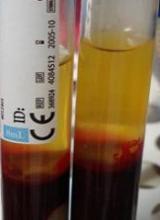HIT Confirm, a test used to diagnose heparin-induced thrombocytopenia (HIT), has received the CE mark.
This means the test meets regulatory requirements and health, safety, and environmental protection standards for products sold within the European Economic Area.
HIT Confirm is a flow cytometry-based test developed by Emosis. The test can be performed on any flow cytometer and provides results within 30 minutes.
HIT Confirm requires a low-volume sample (microliters) of platelet-rich plasma to confirm the presence of HIT antibodies that lead to the formation of a heparin-antibody-PF4 complex that will bind to platelets and activate them.
HIT Confirm requires a single incubation with 2 fluorophores against a marker of platelets (CD41) and a marker of activated platelets (CD62).
After 30 minutes of incubation with 2 dose levels of heparin (0.3 U/mL and 100 U/mL), the proportion of activated platelets is obtained via flow cytometry.
Results are interpreted using a platelet activation index called HEPLA, which was developed by Emosis.
Research presented at the 2017 ISTH Congress (abstract OC 34.3*) indicated that HIT Confirm produces results comparable to those provided by the serotonin release assay (SRA).
Researchers tested the sensitivity and specificity of SRA and HIT Confirm when analyzing plasma from 290 patients—131 of whom were deemed HIT-positive by experts.
When compared to expert opinion, HIT Confirm provided 90% sensitivity and 94% specificity. SRA provided 80% sensitivity and 94% specificity compared to expert opinion.
For more information on HIT Confirm, visit the Emosis website.
*Data in the abstract differ from data provided by Emosis. The data used here were provided by Emosis.


